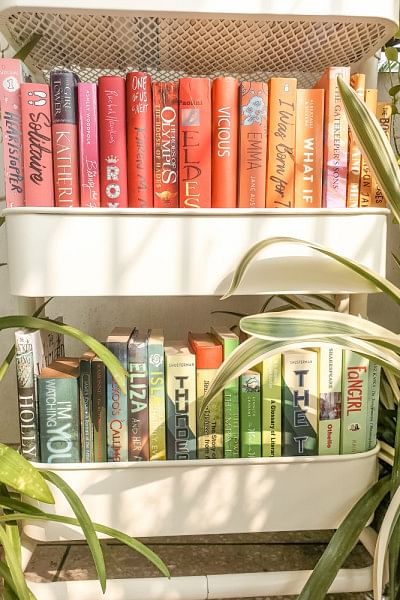Is book blogging in Bangladesh a privilege?

You walk into a room and come across stacks and stacks of books neatly arranged on shelves lining the walls, a couple of pristine white bedsheets, an intricate marble backdrop, and the smell of half a dozen candles blending together as your eyes are drawn to the centre of attention: glimmering, gold-foiled book covers. This is the commonly seen, romanticised setup for a book blogger's photoshoot. Unfortunately, the real, behind-the-scenes process of blogging in Bangladesh can be quite different.
For those living in tiny, cramped apartments, it can be a struggle to find a corner of the house to set up as the ideal backdrop for that perfect social media post. It can be hard to find a quaint little coffee shop to take photos in, or a crowdless street to strike a pose.
Sharfin Islam, a prominent book blogger popularly known as @atinyreader on Instagram, shares, "The aesthetics that lured us into the community are styled around the [things that] a more developed country would have."
Fellow bookstagrammer Mahjabin Muntaha (@murmursandmusings), whose Instagram post on the privilege of book blogging in Bangladesh sparked this entire conversation in June 2021, echoes, "Most Bangladeshi households are cramped, worn-down, overcrowded. The bedsheets are mismatched, the paint on the wall is chipped and it seems impossible to get a photo without the imposition of some tins or jars in the frame."

We tend to view bookstagramming, or book blogging in general, through a romanticised lens of what an ideal photograph of books should look like. And that ideal view most often includes spending a lot of money on expensive books and props to make our not-so-ideal surroundings look more "bougie" than they actually are. While it is possible to work on a budget, resources can be limited. Most bloggers can't even afford the original, hardcover books that get the most amount of views and likes on social media.
That brings us to a bigger conversation about reader sustainability and how bloggers in countries like Bangladesh are often overlooked and do not get the same opportunities as our Western, or even Indian, counterparts. More often than not, we have to resort to buying the cheaper and more accessible local versions of books. The downside of this, however, is that these local prints are often pirated and fall into the "grey area" of reader consumption. For street hawkers and sellers of secondhand books, the sale of local copies can bring some much-needed income. But it becomes more complicated when the local copies are being produced by well-to-do publishers; the authors, artists, and original publishers of those books, in that case, are not being properly commissioned for their hard work. Unfortunately, when faced with the choice of supporting these authors or being able to buy more books, most people choose the latter.

But when life gives you lemons, you make lemonade. So, we learn to adapt. Once we learn to use the resources we have around us, we can create our own aesthetic, centered around our deshi culture and our own style of content. It is more a matter of outlook and knowing how to use certain objects, rather than recreating the exact same Pinterest-style photos. Instead, we could concentrate more on connecting with our audience and putting out content that shows our unique style and passions. Followers will naturally gravitate towards accounts that curate interesting stories and unique outlooks.
Farah Ghuznavi, a full time author and part time bookstagrammer, recommends focusing more on the stories behind the books and connecting with people through the content rather than on the aesthetics. Yes, having the perfect visual element can mean a lot for aspiring bloggers, but at the end of the day, book blogging is a way to share our love for stories with the world. It is a passion, not a requirement.
Sara Kabir is a dreamer, a literature major, and a writer. She is often found juggling academics and her countless hobbies. Help her figure out what to write about next @scarletfangirl on Instagram.

 For all latest news, follow The Daily Star's Google News channel.
For all latest news, follow The Daily Star's Google News channel. 








Comments